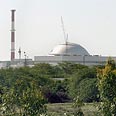
Iranian nuclear reactor
צילום: איי אף פי
Expert: Nuclear Iran a regional power
Former senior intelligence officer warns nuclear Iran could lead to regional arms race
Nuclear weapons in Iran's hands will turn it into the "number one power in the Middle East," Colonel (Res.) Shimon Boyarsky, formerly head of the Iran and Iraq desks in the IDF intelligence branch told Ynet.
Boyarsky said that "Iran will have economic abilities in the form of oil, an enormous population of around 75 million people, nuclear weapons, and a fundamentalist regime that will want to spread its revolution. It will feel much freer than Israel."
Theoretically, the real danger of Iranian nuclear weapons in the hands of the Ayatollah regime is an immediate firing of a nuclear bomb at central Israel. But not everyone in Israel sees the Iranian threat as an immediate danger.
In other words, allies of the Iranians, like Hizbullah, will work with a freer hand to carry out terror attacks against selected targets in the Middle East and the world, for example, something that will destabilize the situation in the region.
Another phenomenon worth thinking about is the danger of a nuclear arms race in the region, headed by the Saudis and Egyptians, who won't want to lose their prominent position to the Ayatollahs in Iran. Boyarsky certainly agrees with this claim. "Unlike those who are yelling, I believe that Iran is developing nuclear weapons not to destroy Israel but to obtain deterring weapons that can protect the regime against anyone who tries to harm it from outside. They already know how to deal with enemies from home."
According to Boyarsky, Iran prefers North Korean model: "They see that the world deals with North Korea with silk gloves and that is their aim."
Arab countries affected
"Nuclear weapons will certainly threaten Egyptian hegemony in the area, Syria's position, they will endanger Kuwait, and maybe even shock Iraq, which may be Shiite, but is Arab and not Persian," Boyarsky says. "There is no doubt that with this weapon, Iran will feel much freer. We've already seen their ability when it comes to terrorist attacks they carried out in the region. There is certainly a possibility that the area will enter an arms race, but it's fair to assume that the countries will first wait to see how the international community will act."
Is there significance to the timing of Iran's declaration? Boyarsky says he didn't fall off his chair when he heard Ahmadinejad.
"The former head of IDF intelligence, Major General Zeevi-Farkash, said in a number of interviews that the Iranians will reach the point of no return in March, and it could be that this is the point. In addition to that, the comments could certainly have been made as a response to reports at the beginning of the week that the U.S. is planning to attack Iran. I have no doubt that the Americans are indeed planning an attack, but I think that President Bush will first try to the diplomatic process and these declarations can definitely help him," Boyarsky says. "In general, I find it hard to see an attack on Iran as long as the American army is treading in Iraq. In my opinion, the president, who ends his term in 2008, won't want to be portrayed as someone who drowned his army and therefore it's hard for me to see him ordering a new attack."










